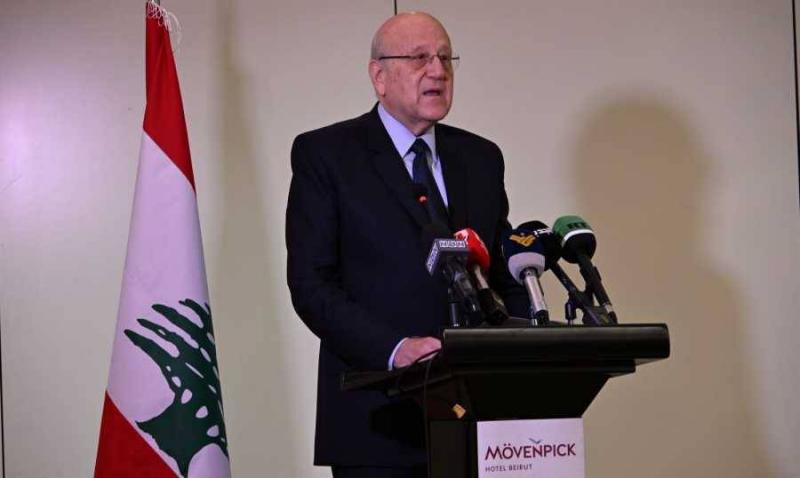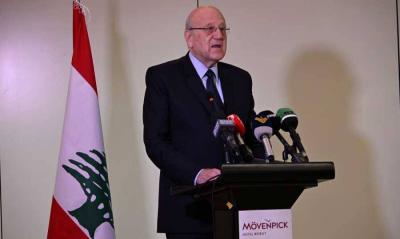Prime Minister Najib Miqati chaired a meeting of the Higher Strategic Council of the Education Trust Fund (TREF) held at the Grand Serail, with the participation of the Minister of Education and Higher Education in the caretaker government, Abbas Halabi, Secretary General of the Council of Ministers Judge Mahmoud Makiyeh, Director General of the National Commission for UNESCO Dr. Hiba Nashabe, ambassadors of donor and partner countries, representatives of UN organizations and government agencies, partners in supporting the Education Trust Fund (TREF), and the educational family, including the Ministry of Education and the Educational Center for Research and Development, as well as high-level teams from embassies and organizations.
The Director General of Education, Imad Ashkar, welcomed attendees and affirmed that "every child in Lebanon has the right to a good and developed education that qualifies them for a bright future." He pointed out that "the Ministry of Education, along with its directorates, educational areas, school directors, teachers, and educators, is working hand in hand to achieve the objectives set in forming the trust fund and to progress in improving the quality of education, reducing unnecessary costs, and qualifying and professionalizing teachers."
Halabi stated, "The Higher Strategic Council of the Education Trust Fund (TREF) is meeting today at the Grand Serail under the generous sponsorship of Prime Minister Najib Miqati, in the presence of ambassadors and representatives of international organizations and multilateral agencies, to witness the achievements made in responding to the urgent needs of education in the impossible conditions Lebanon is living through, suffering from the ravages of wars and crises that have consumed its resources and capacities without exception."
He noted that "the Ministry of Education and Higher Education is responsible for the education sector in all its components and levels, from general education to vocational and technical education, then higher education and the Educational Center for Research and Development. This ministry has honored its commitments regarding securing education for all children present on Lebanese territory, entering a stable reform process to modernize unnecessary expenditures, and reducing waste caused by overcrowding and failing schools, and it has pursued a policy of merging schools to reduce the number of contractors and school rents, among other initiatives."
He continued, "The Ministry of Education has continued its steady vision for educational advancement through a comprehensive outlook on the future of education, raising the level of education, and improving its quality despite the circumstances. It has strengthened inclusive schools to accommodate learners with special needs and learning difficulties, as well as implemented student protection measures in the public school environment, beginning to enforce them more strictly in private schools. The ministry nearly completed a workshop for developing educational curricula, having reached a stage of training specialists on a unified formulation of curricula, alongside a program to train the teaching staff on professional teaching and competency-based approaches."
He announced that "the ministry has adopted a path of transparency, good governance, and digitization, creating a direct financial relationship between donors and beneficiaries without any influence or intervention in the spending of international support. In all these steps, we apply our strategic plan and maintain continuous communication with international partners and countries and agencies that we find participating in our high-level meeting today."
Miqati expressed gratitude to the attendees, governments, and UN organizations for their presence and efforts, thanking all the working teams they regularly meet for their efforts, contributions, and understanding towards educational issues, which are considered a priority to keep Lebanon resilient. However, he noted that "our commitments have become greater than our capabilities to fulfill our national duties, as we have outlined a short-term plan for managing the sector, maintaining its level and performance, and compensating for learning loss. In the medium term, we are continuing to restore and build new schools to reduce rental costs and expenses that consume budgets, in line with our efforts to reduce spending and use solar energy to lower energy bills and provide operation and service within the school infrastructure."
He added, "We have prepared a detailed analytical report on the funds received through TREF allocated for our school funds and parent councils, based on student attendance numbers over the past two years. Unfortunately, for the 2022-2023 school year, we did not receive any funds from the total of $33 million for school funds calculated based on attendance, resulting in a cost of $0 per student. For the current school year, of the calculated attendance fees amounting to $21 million, we have received $10 million so far. We expect to receive an additional $4 million, leaving a deficit of $7 million. This means the cost for each Lebanese child this year is $27 instead of $40, and the cost for each non-Lebanese child is $54.98 instead of $80. Based on these figures, we find it essential to receive your ongoing support and collaboration."
Miqati emphasized, "As a government, we need to ensure that every child in Lebanon has the right and opportunity for quality education that provides the necessary academic and life skills. This is why a fully funded public education system is a top priority for the Lebanese government. All parents must be able to send their children to school regardless of their economic situation — this is the official directive from the government and my personal commitment as Prime Minister. Despite all the difficulties we face and the campaigns of doubt, we have successfully conducted the official examinations with transparency and professionalism, for which I particularly commend Minister of Education Abbas Halabi and the entire ministry team involved in ensuring the safety and integrity of the examinations."
He further stated, "Over the past two years, despite many obstacles at the family, school, and regional levels, we have seen children and teachers return to school. I appreciate the Education Trust Fund for supporting and accelerating the roadmap for reform in the Ministry of Education for 2025 that we launched together a year ago. The government has taken swift and exceptional measures to provide financial support to the education system, including primary, secondary, vocational, and Lebanese university education. Practically, this means significant local investment to allow productivity compensation to ensure that our hardworking teachers receive adequate salaries to meet their needs in a highly volatile economic environment."
Edward Paglieri, UNICEF representative in Lebanon, noted, "UNICEF's mission in Lebanon is to support the government in ensuring that every child, young boy, and girl stays in school longer to learn more. Since its inception two years ago, the Education Trust Fund (TREF) has played a crucial role in accelerating reforms that enhance formal education in Lebanon, including multiple flexible pathways for out-of-school children to gain education and transition into formal education. I would like to thank the commitment of the international community, particularly the European Union and Germany, for their ongoing support for the education sector and the necessary reforms to address the learning crisis in Lebanon."
The ambassadors then took turns speaking. European Union Ambassador Sandra Douala said, "In light of the many challenges facing the country, we are determined to safeguard the future of children in Lebanon. Ensuring every child has the right to quality education is our common goal as partners and our collective responsibility with the Lebanese government. While the education sector reform is ongoing, it requires political will. Therefore, we call on the government to prioritize the quality of education and invest more in children's education in Lebanon, starting from increasing the public budget allocated to the Ministry of Education and Higher Education. We also urge the government to prepare for the next academic year through sound planning and budgeting forecasts."
British Ambassador Haimish Call remarked, "I was pleased to attend the second anniversary of the launch of the Education Trust Fund (TREF) in cooperation with the Ministry of Education and Higher Education (MEHE), UNICEF, and partners at the Grand Serail, under the patronage of Prime Minister Najib Miqati and Minister Halabi. The United Kingdom has been a long-time partner in education in Lebanon and is one of the newest partners to join the TREF. This year, we will contribute £2.6 million to support the most vulnerable out-of-school children to return to their seats in classrooms."
French Ambassador Hervé Magro stated, "Quality education is the cornerstone of any nation's development. It is not measured merely by the academic knowledge provided, but also by students' ability to think critically, solve problems, and become engaged citizens. France's commitment to Lebanon in education particularly remains firm and steadfast. We are confident in the efforts of the Minister, along with donor partners and UNICEF's technical contributions, that we can overcome challenges to create an educational system that not only meets current needs but anticipates future challenges."
Italian Ambassador Fabrizio Marchi stated, "Italy supports and is committed to the education sector in Lebanon during this difficult period," adding, "Italy truly values this high-level coordinating meeting among donors and education stakeholders, and will continue its fruitful cooperation with the Ministry of Education and Higher Education, through UNICEF and the Italian civil society's involvement. Additionally, alongside Lebanese authorities, we will continue to protect and promote the right to inclusive and high-quality education for every child."
German Deputy Ambassador Katharina Lack said, "Germany has been a strong and reliable partner for Lebanon in education for over a decade. We look forward to expanding this partnership in the coming school year. However, renewed efforts from the Lebanese caretaker government will be needed to ensure local funding."
Dutch Chargé d'Affaires Silvia Deppen noted, "By prioritizing investment and reform in education, Lebanon can reaffirm its position as a center of educational excellence, empower its youth, stimulate economic growth, and build a strong community capable of facing future challenges."
Swiss Deputy Head of Mission Maya Messmer Moukhtar stated, "The Education Trust Fund (TREF) supports children both in and out of school in a coherent and coordinated manner. The approval today by the Higher Strategic Council of a new framework allowing out-of-school children to transition into formal education represents a significant reform achievement. Behind TREF’s success in providing the right to education for all children in Lebanon are two key elements: First, a shared vision that starts with the needs of the most vulnerable children and prioritizes quality and preventive education. Second, strong coordination between the Ministry of Education and its international partners. In the coming years, an increase in education allocations within the public budget and effective resource utilization are the only guarantees for the continuity of formal education in Lebanon."
The head of the Educational Center for Research and Development discussed "the details of the stages the educational curriculum development project has achieved, from the national framework and supporting documents to selecting candidates for writing subject curricula and then training them on unified formulation." She indicated that "all this would not have been achieved without the support and close follow-up from the Minister of Education and Higher Education Dr. Abbas Halabi, who engaged all Lebanese and officials in this major national workshop."
Finally, the Assistant Director-General Dr. Georgia Hashim explained in detail the financial contributions received from donors, partners, and supporters, as well as methods of expenditure, revealing the outstanding amounts needed to cover expenses. Additionally, the minister’s advisor for external communications Maher Hassania presented numbers regarding financial contributions and spending areas, whether from public finances or international entities, pointing out the accumulated dues that must be settled for the ministry to continue providing education for all.




